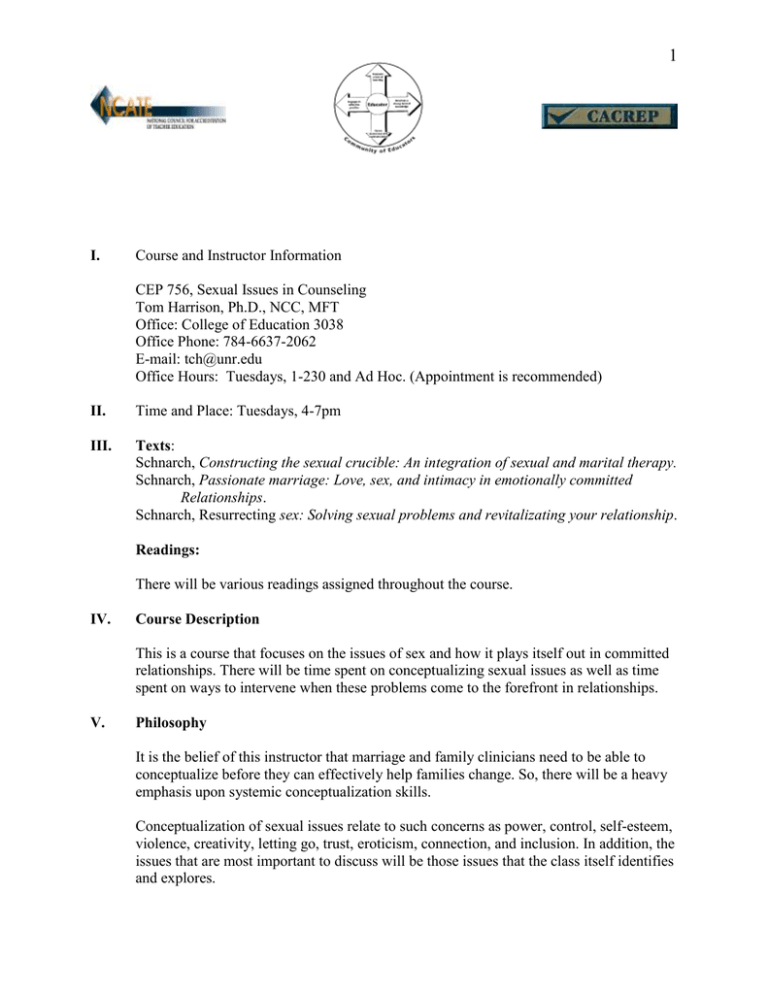
1
I.
Course and Instructor Information
CEP 756, Sexual Issues in Counseling
Tom Harrison, Ph.D., NCC, MFT
Office: College of Education 3038
Office Phone: 784-6637-2062
E-mail: tch@unr.edu
Office Hours: Tuesdays, 1-230 and Ad Hoc. (Appointment is recommended)
II.
Time and Place: Tuesdays, 4-7pm
III.
Texts:
Schnarch, Constructing the sexual crucible: An integration of sexual and marital therapy.
Schnarch, Passionate marriage: Love, sex, and intimacy in emotionally committed
Relationships.
Schnarch, Resurrecting sex: Solving sexual problems and revitalizating your relationship.
Readings:
There will be various readings assigned throughout the course.
IV.
Course Description
This is a course that focuses on the issues of sex and how it plays itself out in committed
relationships. There will be time spent on conceptualizing sexual issues as well as time
spent on ways to intervene when these problems come to the forefront in relationships.
V.
Philosophy
It is the belief of this instructor that marriage and family clinicians need to be able to
conceptualize before they can effectively help families change. So, there will be a heavy
emphasis upon systemic conceptualization skills.
Conceptualization of sexual issues relate to such concerns as power, control, self-esteem,
violence, creativity, letting go, trust, eroticism, connection, and inclusion. In addition, the
issues that are most important to discuss will be those issues that the class itself identifies
and explores.
2
There will be an emphasis upon reflection as well as upon sharing information. The
content of this course is, of course, provocative. We will need to conduct ourselves with
aplomb as we research and investigate the nuances of sexual interaction.
VI.
Goals and Objectives
A. Personal and Professional Growth
Develop an awareness of the impact of sexual issues on clients and their relationships.
Develop an awareness of personal narratives about sexual issues.
Develop a personal style of counseling families with sexual issues.
Integrate personal and professional knowledge base of counseling families with sexual
issues to become a more effective family counselor, who can understand and address
families and family members’ sexual issues across differing ages, gender, personal
characteristics, traits, capabilities, and life circumstances.
B. Professional Knowledge, Skills, and Strategies
Enhance conceptualization skills of sexual issues operating in families.
Enhance skills in the application of concept to therapeutic situations and interventions.
Enhance your understanding of the role of sex in emotionally committed relationships.
VII. Student Expectations and Accommodations and Services for Student with Disabilities
“Students are expected to:
Attend class and complete all assignments with the expectations established by the
instructors and programs of study to reflect a love of learning.
Conduct themselves in the classroom in a manner that contributes to a positive learning
environment for demonstrating democratic values and respect for diversity.
Familiarize themselves with the Syllabus and with all university policy and procedures to be
a knowledgeable student.
Ask questions and seek clarification for any class assignment, university policy or procedure
that is unclear. Students may be expected to complete class requirements beyond the
published meeting times. This varies by course and instructor.” (University of Nevada, Reno
1997-1998 General Catalogue, p. 8).
“The Disability Resource Center (DRC) offers a wide range of support services and
accommodations for students with specific documented disabilities. The DRC believes that you
will find the students, staff, and faculty at the University of Nevada, Reno to be sensitive to your
needs and eager to make every reasonable accommodation to assist you in attaining your
academic goals. Sometimes, however, you may encounter a situation or concern that requires
assistance. FEEL FREE TO CONTACT OUR OFFICE. YOUR NEEDS ARE OUR CONCERN.
The DRC is located in room 107 of the Thompson Student Services Center. 784-6000.”
3
VIII
VII.
IX.
Course Content Areas
The sexual zeitgeist
Eros and erotica
Bodies
The role of sex in committed relationships
Arousal issues
Orgasms
Power and control in committed relationships
Gender issues
Finances and Sex
Celibacy in committed relationships
Sexual oppression
Sexual enhancement drugs
Therapeutic interventions
Student Performance Assessments
Erotic Art Project
Paper describing your personal views of sexual issues in counseling.
Student Performance Criteria
A. Knowledge base for Counselor Education: Students are to possess a love of learning,
develop a strong fund of knowledge, value democratic and multiculturalism and engage
in reflective practice.
B. Overall:
270 – 300 points = A
240 – 269 points = B
210 – 239 points = C
Student Performance Assessments
Erotic Art Project (200 points)
This assignment is simple. You will need to create an erotic work of art. This needs to be
a major investment for you so that the final product is something worthy to be shown to
the class during the Art Show. You will need to spend time on this project. Quantity is
important in doing art. You may either show ONE piece of art in its final form OR a
series of art endeavors in that you deemed unfinished or unworthy.
4
Your project needs to be art. Even if you think that you are horrible at it. You will need
to produce art. You can choose from performing arts, poetry, short stories, sculptures,
paintings, visual arts, and other art forms.
Your art work will need to be erotic. What aspect you focus on is totally yours.
You will need to describe your artwork before the class during the Art Show.
In order for you to get more in touch with your own sexuality and issues related to sex,
my preference is that each of you do your OWN project.
Sexual Issues in Counseling Paper (100 points)
We will be discussing various aspects of sexual issues that are presented in therapy.
Some perspectives will focus on the mechanics of sexual activity, while others may focus
more on the symbolic meanings of sexual practices.
Please write up a position statement (3-5 pages) outlining your conceptualization of
sexual issues in therapy. Include:
What issues do you think you will see the most?
How come?
Provide at least three ways of conceptualizing the sexual issues you think you will
see in therapy.
Choose one perspective that reflects more of your personal style of
conceptualizing and your preferences for treating these issues.
Important Dates
Thursday, January 27
Final date for adding classes
Changing from letter grade to S/U
Changing from S/U to letter grade
Changing from audit to credit
Final date for late registration and paying registration fees
Final date to receive 100% refund if completely withdrawing from the U
Final date to receive refunds from dropping individual classes
Monday, February 21
Legal Holiday
Tuesday, March 1
Applications for Spring advanced degree graduation filed with Graduate School.
Applications for graduation must be purchased and submitted online
Friday, March 4
CEP COMPREHENSIVE EXAMINATION
5
Friday, March 11
Final date for dropping classes
Friday, March 25-Sunday, April 3
Spring Break
Monday, April 25
Final date for filing graduate final oral examination reports
Final date for filing approved thesis or dissertation with Graduate School
Friday, April 29
Applications for graduation for those graduating in DECEMBER, 2005 due at the
Graduate School
Wednesday, May 4
Dead Day
Friday, May 13
Spring Commencement
Monday, May 16
Final grades posted
Course Schedule
January 18, 2005
Introductions and course overview
Discussion of topics to be discussed
January 25
The sexual zeitgeist
February 1
The sexual zeitgeist
Therapeutic implications
February 8
Eros and erotica
Therapeutic implications
February 15
Bodies
Therapeutic implications
February 22
The role of sex in committed relationships
Therapeutic implications
6
March 1
Arousal issues
Therapeutic implications
March 8
Orgasms
Therapeutic implications
March 15
Power, control, and sex in committed relationships
Therapeutic implications
March 22 SPRING BREAK
March 29
Gender issues
Therapeutic implications
April 4
Money and sex
Therapeutic implications
April 11
Celibacy in committed relationships
Therapeutic implications
April 18
Sexual oppression
Therapeutic implications
April 25
Sexual enhancement drugs
Therapeutic implications
May 3
May 8 FINAL EXAMINATION



